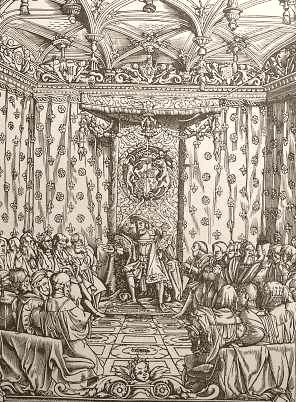Crown v. church
Henry had little trouble passing his antipapal legislation. The bishops and abbots, who formed a majority in the House of Lords, owed their sees* to the Crown. The House of Commons was composed of landowners and wealthy townspeople who were interested in acquiring Church lands. In addition, the social and economic teachings of the Church, and pluralism and illiteracy among the clergy, fuelled an atmosphere of anticlericalism in the Houses of Parliament.
Submissive clergy
In an act known as "The Submission of the Clergy" (1534), Henry VIII abolished the Pope's right to appoint bishops. The early establishment of Crown control over ecclesiastical appointments was one reason papal authority was so easily overcome.
